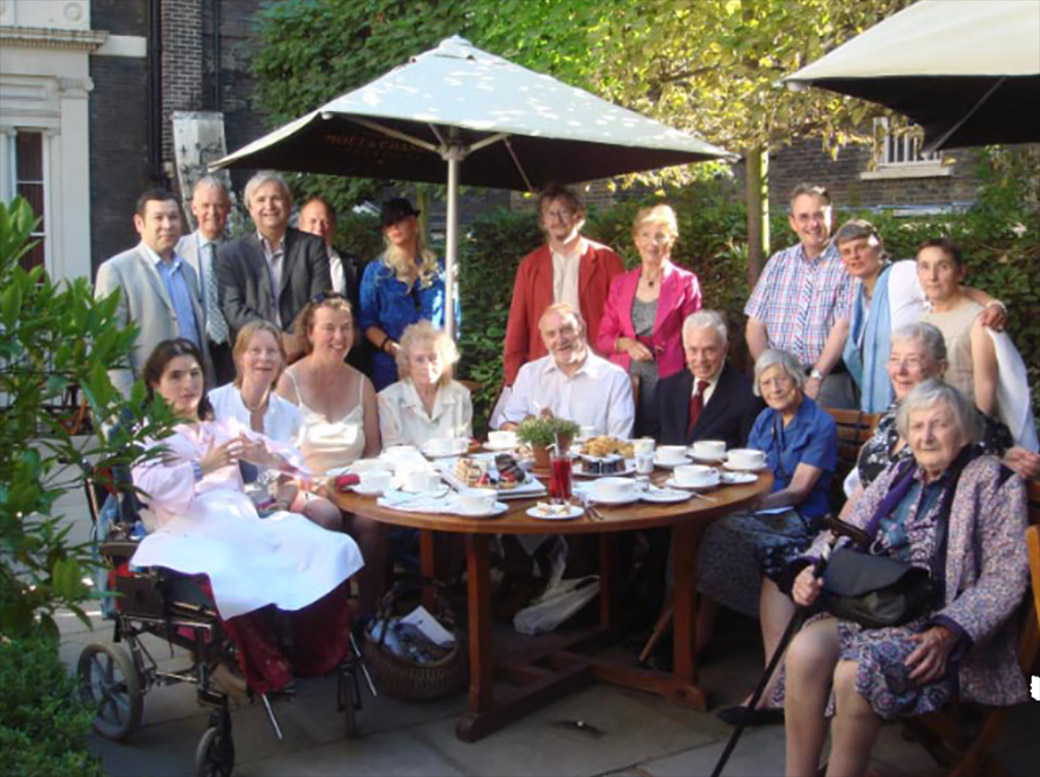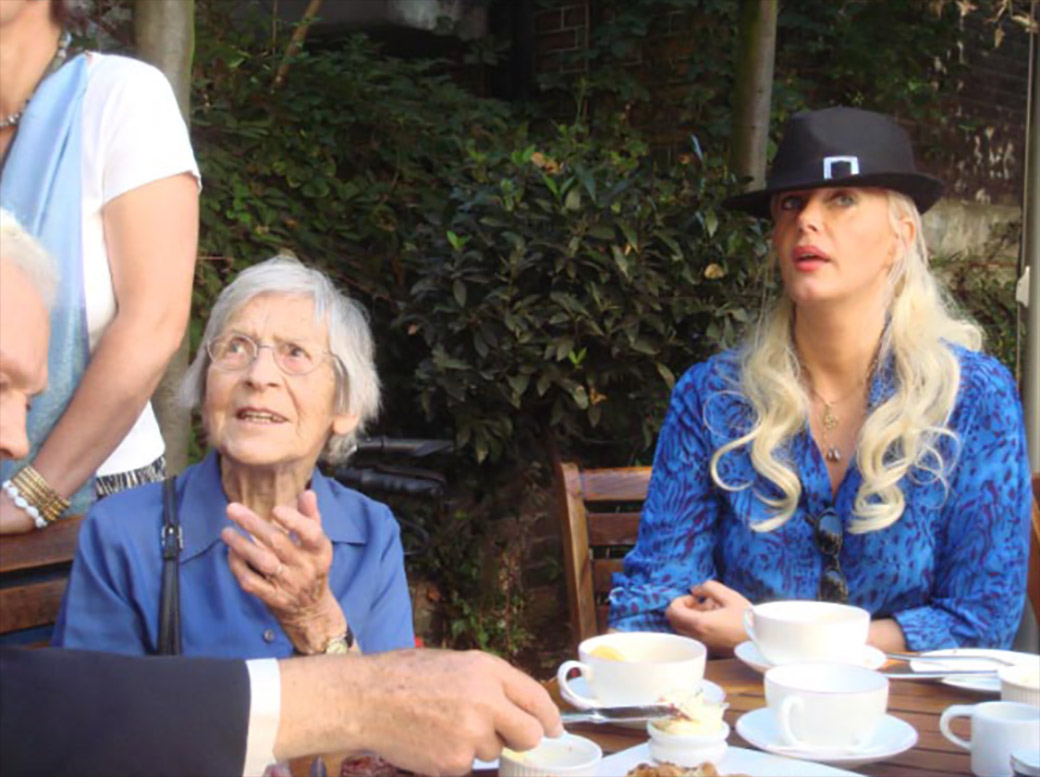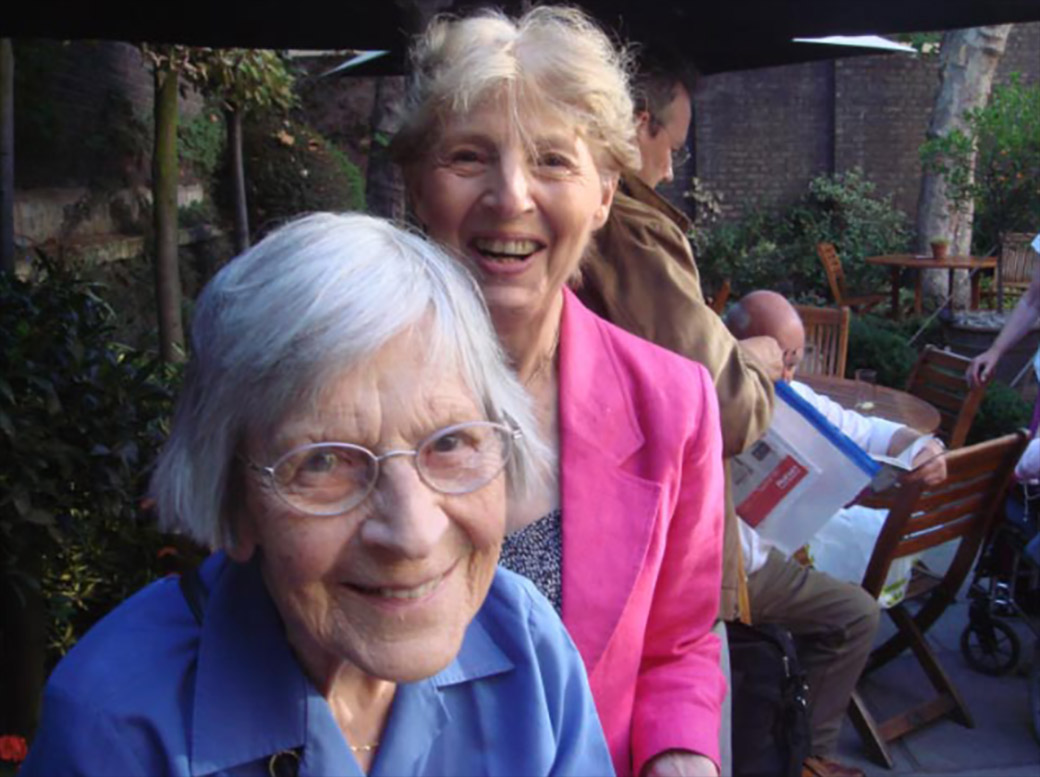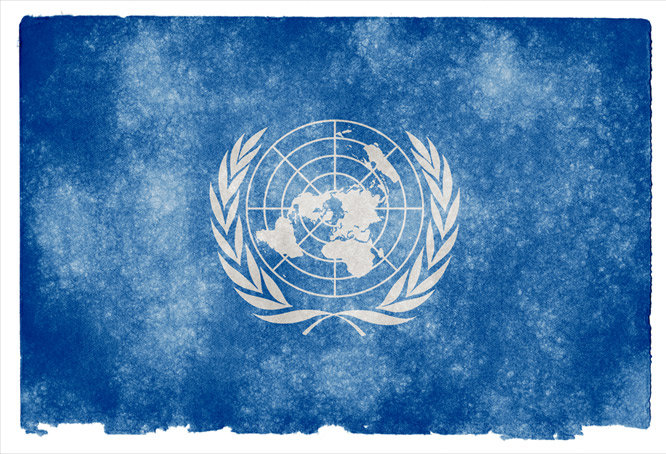- 2023
- 2022
- 2021
- 2020
- 2019
- 2018
- 2017
- 2016
- 2015
- 2014
- 2013
- 2012
- 2011
- 2010
- 2009
- 2008
- 2007
- 2006
- 2005
- 2004 - 2002
- 2001
2019
Annual Report 2019.pdf23 September - Meeting hosting the ‘Imam and the Pastor’ to discuss ‘The Road to Peace in Nigeria’
Meeting hosting the ‘Imam and the Pastor’ to discuss ‘The Road to Peace in Nigeria’
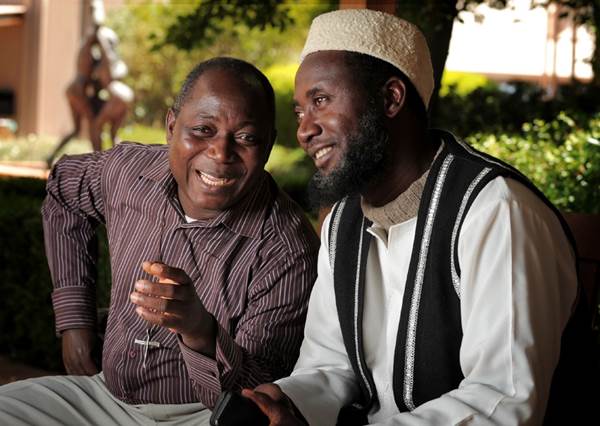
Westminster UNA members and guests were fortunate to hear Pastor Dr James Wuye and Imam Dr Muhammad Ashafa, known worldwide as the Imam and the Pastor from the film of the same name, speak about their continuing efforts to strengthen inter-faith relations. The meeting titled ‘The Road to Peace in Nigeria’ took place at the time of the International Day of Peace (21 September).
The two men had met in 1995, during a UNICEF outreach programme about child immunisation against polio, hesitantly putting aside their differences for the sake of the larger community. They realised that their voices, speaking together, could convince more people to protect their children against a common threat. Their agreement was cautious and guarded at first, gradually building over the years the respect and trust necessary to form a partnership.
Imam Ashafa described Nigeria’s unique challenges. Its peoples speak about five hundred languages, work within three legal codes and are divided about 50/50 between Christians and Muslims making it one of the world’s most religious nations. Challenges included the spoiling role of Boko Haram and others which has led to the deaths of 250 thousand people and the displacement of more than 4 million. The level of insecurity was exacerbated by kidnappings, banditry on the borders, and traditional rivalry between farmers and cattle breeders.
Pastor James added that deforestation leading to desertification had brought more challenges, introducing political issues which, if not tackled by Nigeria’s leadership, could further destabilise the community. In such a religious country, discontent was too often manifested by attacks on churches and mosques.
Together, he told his audience, they had set up the Interfaith Mediation Centre in 1995, still the only one. They work together to act as an example to their communities that peace is possible. They teach members of youth militias methods to resolve their conflicts peacefully rather than infinitely escalating violence and have even led successful efforts to rebuild the churches and mosques that had fallen during their conflict. The Centre has contributed to defusing tensions in the 2002 and 2004 clashes in Kaduna and Yelwa.
Over the years, they have tackled hate speech and set up pilot projects in six Nigerian states. Soon, a new law on hate speech will be introduced in Nigeria’s federal parliament. Other initiatives have followed, such as marking the UN Interfaith harmony week but more importantly, providing a much-needed platform for discourse. Soon, a new Interfaith Institute of Peace will be set up. In 2017, the Interfaith Mediation Centre, was among five recipients of the prestigious ‘Intercultural Innovation Award’, conferred by the United Nations Alliance of Civilizations and BMW held at the UN in New York.
Also, Imam Muhammad Ashafa and Pastor James Wuye have received the Breme Peace Award in 2005, the Prize for Conflict Prevention awarded by the Fondation Chirac in 2009[3] and the Deutsche Afrika-Preis awarded by the German Africa Foundation in 2013. Ashafa also received the Peacemaker in Action Award in 2000 from the Tanenbaum Center for Interreligious Understanding.
Dr Alan Channer, Director & Producer of ‘The Imam and the Pastor’ and Co-Director of the ‘Summer Academy on Land, Security and Climate’, Geneva, referred to a 2007 report on the state of tension in Nigeria and the danger of this becoming weaponised.
Dr Musa Aliyu, lecturer in Journalism and Media, Coventry University and author, researcher and commentator on Boko Haram, spoke about the importance of working closely with traditional rulers and asked how the diaspora might help.
He recalled how Pastor Wuye and Imam Ashafa had responded to a similar question in New York, 'How can we, the audience, join you in making a difference?’ They had replied: 'Share with everyone that tackling farmer-pastoralist conflict will restore the social fabric of the Sahel region, while healing the land will restore the environmental fabric. Support inter-dependence, celebrate the gifts of diversity and collaborate to care for the planet wherever you are - and we will make a difference to our world.' Perhaps a meeting of experts could be convened to develop a framework of action, he suggested.
Amina Dikedi-Ajakaiye, President, Creators of Peace on Geneva, raised three issues; gender, for which she praised the work and support of Initiatives for Change, the prevalence of corruption which has resulted in shortfalls in funding for schools, hospitals and roads, and the need for the diaspora to become more involved.
David Wardrop, chair of Westminster UNA, remarked on what had been such an illuminating meeting and assured Dr Wuye and Imam Ashafa of continuing support. He thanked Initiatives of Change for arranging their visit to the UK which included an appearance at the previous Saturday’s event at the Shakespeare Globe theatre marking the 20th anniversary of the founding of Peace One Day.
The meeting was chaired by Dr Philip Murphy, Director of the Institute of Commonwealth Studies at London University, joint organiser of the meeting.
For an excellent interview with Dr Wuye and Imam Ashafa, see here.
27 February - Westminster Young Professionals host Algerian ambassador
Westminster Young Professionals host Algerian ambassador
Westminster UNA Young Professionals have continued their ‘Meet the Ambassador’ series, hosting HE Amar Abba, Ambassador of Algeria and Dean of the African Union Heads of Mission in the UK. Prior coming to London, Mr Abba served in Luanda, Brasilia and Geneva. His ambassadorial postings have been in Tanzania, Greece and the Russian Federation.
In opening the meeting, Harry Wright, Chair of Westminster UNA Young Professionals, thanked Ashfords LLC for their hospitality in hosting the meetings series. He then introduced the ambassador, noting that Anglo-Algerian relations go back four hundred years and recommending the famous Algerian Coffee Stores in Soho has been operating since 1887.
Mr Abba titled his address Algeria and Multilateralism and gave his audience an overview of major events in Algeria’s development since its battle for independence led by the Algerian National Liberation Front and won in 1962. From then on, Algeria has played an important role in the development of the Non-Aligned Movement, hosting important conferences during the 60s and 70s. He referred also to Algeria’s success in conflict resolution and peacebuilding, noting contributions in these fields by Lakhdar Brahimi and the late Mohamed Sahnoun.
Following his address, Mr Abba answered a number of questions covering Algeria’s role in the African Union, its relations with Europe and democratic routes to presidential succession.
Following the meeting, the Westminster Young Professionals hosted a networking meeting in the nearby ‘Draft House’.
HE Amar Abba, Ambassador of Algeria with Harry Wright, and Isabella Qin, Deputy Chair
2018
Annual Report 2018.pdf6 December - Successful ‘Hands Off Africa!’ conference reunites participants after sixty years
Successful ‘Hands Off Africa!’ conference reunites participants after sixty years
The conference, “The All African People’s Conference: Accra 1958 Its Impact Then and Now”
took place in the University of London, attracting speakers and audience members from several countries. It was organised by Westminster UNA, together with the Institute of Commonwealth Studies at the University of London.
The conference keynote speech titled ‘Pan-Africanism and Relations Today between Africa and the Commonwealth’ was delivered by former Commonwealth Secretary-General H.E. Chief Emeka Anyaoku. Throughout the day, speakers referred to events during the conference described by one delegate as ‘A moment at once defining and awe-inspiring’.
Speakers included two who had attended the 1958 conference, Cameron Duodu, a journalist from Ghana and Professor Bereket Habte Selassie, a delegate from Ethiopia. Also, the conference screened a pre-recorded message from Dr Kenneth Kaunda, former President of Zambia, who also attended. The closing session, a round table chaired by the Rt. Hon. the Lord Boateng, reflected on how the 1958 conference had helped determine Africa’s course over the following sixty years. A schedule of principal attendees at the 1958 conference is here.
David Wardrop, Chair of Westminster UNA, shared the view of many, stating “It was a privilege to meet and hear those who were there in Accra in 1958, and to learn about those others who had played such a major part in the development of the continent.” A film of the conference will be accessible through the website of the School of Advanced Study at the University of London.
Conference attendees learned about the major three day conference marking the original event, taking place at the University of Ghana in Accra and that the organisers of both conferences had cooperated closely to mark this important anniversary.
For longer report of conference, see blog in Review of African Political Economy, click here
For commentary on event by attendee Mpumelelo Tshabalala, click here
For report on conference held in Accra, Ghana, to mark the anniversary, click here
24 November - 13th We The Peoples Film Festival announces Best Film awards
13th We The Peoples Film Festival announces Best Film awards
The 13th We The Peoples Film Festival ended on 24 November. Forty films were screened over eleven evening, selected from about four thousand submitted from 130 countries. The We The Peoples Film Festival, a project of Westminster United Nations Association, is one of the very few film festivals worldwide which searches for films which address issues such as security, human rights, development and the environment.
To mark the seventieth anniversary of the Universal Declaration of Human Rights, the festival screened the documentary The Uncondemned which followed the first ever successful prosecution of rape as a war crime which took place at the International Criminal Tribunal for Rwanda in 1998. This flagship event was kindly hosted by Clifford Chance LLP in Canary Wharf. Other venues were the Rio Cinema, Dalston; the Cinema Museum; SOAS, Hackney Attic, Miranda at the ACE Hotel, Shoreditch; and South Bank University.
The Young Film Makers Day held at the BFI Southbank attracted a record attendance. The #TweetaPitch competition attracted forty entrants with ten making their two minute pitch to the panel of judges. The winning pitch was made by film maker Giulia Gandini who plans to make a four minute film addressing homelessness and the digital world. The proposal can be viewed here. The 2017 #TweetaPitch winner, Pascale Kann, screened her film Day by Day which tells the story of Layla, a chalk artist, who is surprised by her period and without tampons, pads or any other supplies, attempts to make it through the day. For full reports on the 2018 We The Peoples Film Festival, visit the festival’s website here.
The Festival judges chose the following films for awards.
Best Film in Festival
Syria’s disappeared: the case against Assad
(Director: Sara Afshar)
Best Film: Human Rights
As Human As I Am
(Director: Alice McDowell)
Best Film: Human Security
The Truth: Lost at Sea
(Director: Rifat Audeh)
Best Film: Human Development
Are you Volleyball?
(Director: Mohammad Bakhshi)
Best Film: Environment
The Prophecy – A Warning of Climate Change in Alaska
(Director: Dmitry Trakovsky)
Best Short Film (chosen by the audience at the BFI Young Film Makers Day)
Strive (Director: Charlie Watts)
30 September - UNA Westminster leads informative study tour to European
UNA Westminster leads informative study tour to European
UNA Westminster has completed its week-long Study Tour to The Hague, Brussels, Strasbourg and Paris, all hosting important international institutions. The 14 strong party first visited The Hague, meeting Jeroen Vervliet, Director of the Peace Palace Library who chronicled the life and importance of Hugo Grotius, ‘father of international law’. Later, he showed the party the library’s unrivalled archive of books collected by Grotius himself. The party visited to courtroom of the International Court of Justice, learning about its work and association with the Peace Palace, financed initially by Scottish-American philanthropist Andrew Carnegie. Later, the party attended the opening session of the inaugural Carnegie Peace-Building Conversations, a three day symposium.
In Brussels, the party visited the headquarters of the European Commission (photo), learning about its role as the EU’s political executive and the working relationships between it, the Council and the Parliament. Presentations were also made on the EU’s international humanitarian work through ECHO [1] and also its External Relations policy [2]. Later, they met Guy Milton, Head of Media Relations for the European Council, who discussed the outcome of the recently completed Informal Summit of Heads of Government in Salzburg.
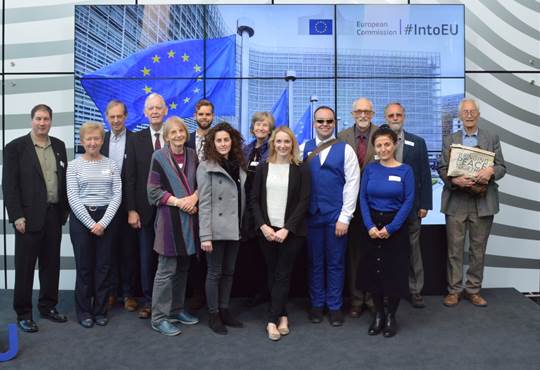
In Strasbourg, the party’s visit coincided with an important hearing before the seventeen judges of the Grand Chamber of the European Court of Human Rights. The case, titled N.D. and N.T. v. Spain, concerns the immediate return to Morocco of sub-Saharan migrants who attempted in 2014 to enter Spanish territory illegally by scaling the fences which surround the Melilla enclave on the North African coast. Later, the party revisited the Court, learning about its workings from a British lawyer working there. Also, they met Rob Linham, the UK’s Deputy Permanent Representative to the Council of Europe who outlined the delegation’s role at the Strasbourg-based institution. Later, they visited the impressive Parliamentarium Simone Veil where the 651 members of the European Parliament meet regularly.
In Paris, they visited the United Nations Educational, Scientific and Cultural Organisation (UNESCO), learning about its multi-faceted nature making it the most difficult UN agency to fully comprehend its important role in the UN system. Later, they visited the Pasteur Museum, housed in the Louis Pasteur’s own house, learning about his pioneering discoveries of the principles of vaccination, microbial fermentation and pasteurisation.
Members of the study tour took the opportunity to visit key attractions in all cities visited; briefly in Rotterdam, its canals; in The Hague, the Mauritshuis, Escher Palace and Binnenhof; in Strasbourg, the cathedral and its quaint streets and canals; and in Paris, its traditional favourites and newer ones like the Frank Gehry-designed Fondation Louis Vuitton, set in the Bois de Boulogne.
Presentations 1 and 2 can be forwarded to those interested.
24 September - Nazanin Zaghari-Ratcliffe: FCO respond to Young Professionals letter
Nazanin Zaghari-Ratcliffe: FCO respond to Young Professionals letter
In early September, the United Nations Association Westminster Young
Professionals Association shared their concerns for the fate of Nazanin Zaghari-Ratcliffe following her continued detention by Iranian officials in 2016. They expressed their grave concern at her current deteriorating situation. “Striving for uprightness is never easy, but history has shown that with sheer persistence and unimaginable determination, justice can be achieved. It is here again that we hope that the government can take action and Nazanin will soon be free” the Young Professionals wrote.
In reply, the Foreign & Commonwealth Office stated that “the treatment of all British-Iranians detained in Iran, including Mrs Zaghari-Ratcliffe, is a priority for the Government. One of the challenges we face is that Iran does not recognise dual nationality and therefore does not allow access to any of the British-Iranian detainees. However we are committed to ensuring that we do everything we can for each of the detainees, including continuing to push the Iranian authorities for access, not least so that we can be assured of their welfare.
It is important that we act in the way that we judge is the most likely to be in the best interests of each of our detainees in Iran, and this is paramount in our consideration of the strategy for each case. However, we can assure you that we raise all of our Iranian consular cases at every opportunity with the Iranian Government.”
21 September - UK UN peacekeeper veterans remember Belgium’s Memorial Day
UK UN peacekeeper veterans remember Belgium’s Memorial Day
In solidarity with Belgian colleagues, to mark Belgium’s Memorial Day, the UK UN Veterans Association which is closely linked with UNA Westminster, organised the laying of a wreath at the tomb of the Unknown Soldier at the Place de Congrès in Brussels. On their behalf, the wreath was laid by Albert Tibor, Secretary of the Belgian UN Veterans Association.
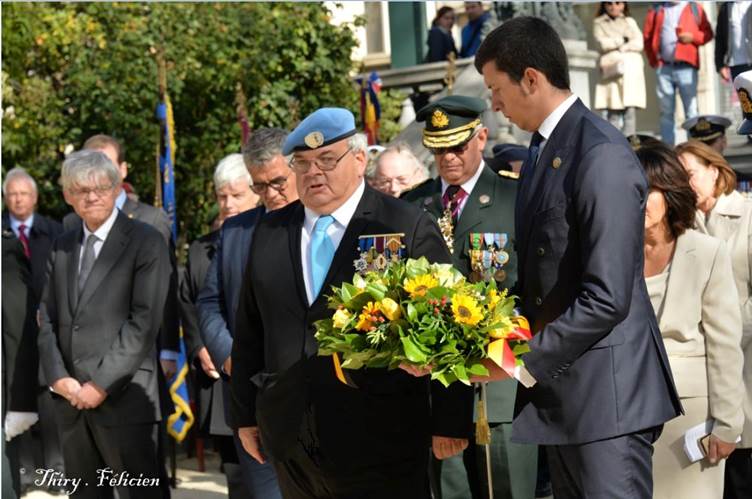
The ceremony marked the sacrifice of Belgian, German, American, Australian, British, Canadian, French, Indian, New Zealand and South African soldiers and civilians who died on Belgian soil in 1918 and also those from Belgium and the Congo who died killed in Africa in 1918. The ceremony took place in the presence of a representative of His Majesty, King Philippe of Belgium.
6 June - Westminster Young Professionals meet the Croatia ambassador
Westminster Young Professionals meet the Croatia ambassador
For the second ‘Meet the Ambassador’ meeting, Harry Wright, Chair, welcomed HE Mr Igor Pokaz, ambassador of Croatia, to address members of the Young Professionals and UNA Westminster.
In his wide-ranging address, Mr Pokaz, recently arrived from Moscow where he served as ambassador, spoke about his earlier service with his country’s mission to the United Nations in New York and serving with the UN in the field. He referred to Croatia’s recent history, leading to its successful applications for membership of the European Union and NATO. These alliances were important for a small country, he stated, referring also to that week's election results in Croatia's neighbour Slovenia where efforts to form a new government around an anti-immigration policy was being watched closely in Croatia. Also he spoke about news from Serbia where President Vucic had restated his opposition to NATO membership. Croatia’s President and Prime Minister were confident however of its chosen course, seeking new opportunities for trade with new partners. In passing, he surprised his audience with the news that the electric-powered Jaguar E Type which Prince Harry drove his new bride to the wedding party had been built in Croatia by Rimac, the leading developer of advanced electric traction systems which works with such companies as Aston Martin, Jaguar Land Rover, and Renault, as well as Siemens and Magna Steyr.
Following his address, Mr Pokaz invited questions which covered a range of topics. Following the meeting, Harry Wright thanked Mr Pokaz and his colleague Mr Domagoj Rogulj who was instrumental in setting up the event. Later, all repaired to the Draft House for a thirsty networking session. The next ‘Meet the Ambassador’ will be in September.
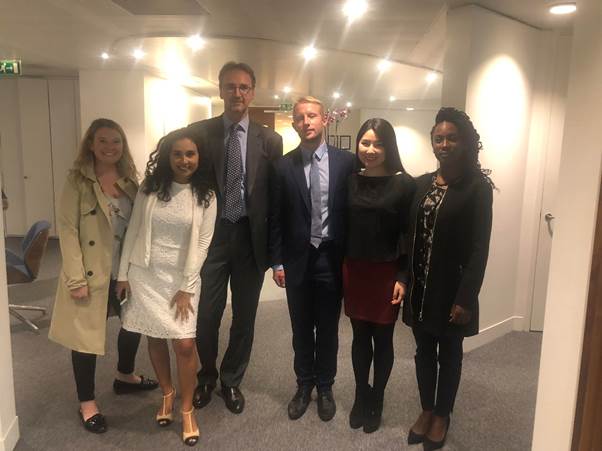
HE Igor Pokaz and the Young Professionals Committee
28 May - It’s time to reignite the Responsibility to Protect principle within UK policy debate, say UNA Westminster Young Professionals
It’s time to reignite the Responsibility to Protect principle within UK policy debate, say UNA Westminster Young Professionals
Young Professionals have now published the Report of their project, initiated jointly with Liberal International in September 2016, which set out to reignite the Responsibility to Protect debate in the United Kingdom. In the Report, they urge UN Member States, and especially the United Kingdom, to reassess their policies regarding R2P. In particular, they urge the British government to initiate parliamentary debate on how R2P can be best implanted into British foreign policy. Click here for the Report
13 March - Westminster Young Professionals inaugurate ‘Meet the Ambassador’ programme
Westminster Young Professionals inaugurate ‘Meet the Ambassador’ programme
Westminster Young Professionals have inaugurated their ‘Meet the Ambassador’ programme, intending to host ambassadors and high commissioners throughout the year, learning about their work and the political challenges facing their countries.

The well-attended meeting was chaired by Harry Wright, Co-Vice-Chair of UNA Westminster Young Professionals (left) and hosted by the law firm Ashfords LLP in New Fetter Lane. The invited ambassador for the inaugural meeting was to have been HE Mr Khaled Al-Duwaisan, ambassador of the State of Kuwait and Dean of the Diplomatic Corps. However, suffering a bout of ‘flu, Mr Nawaf Bushaibah, Consular Affairs Officer (right), took his place. Mr Bushaibah reviewed the ambassador’s special responsibilities as Dean of the Diplomatic Corps and then turned to Kuwait’s current political initiatives, in the Middle East and as currently a non-permanent member of the UN Security Council.
He then told his audience that, after the collapse of the Ottoman Empire at the end of WWI, Britain had taken responsibility for the region covering Kuwait and its neighbours. After gaining independence from Britain in 1961, British soldiers were soon back to defend it against threatened Iraqi aggression, evidence of the strong ties between Kuwait and the UK. Today, he stated, Kuwait has good relations with Iraq and also, in its capacity as chair of the Gulf Cooperation Council (GCC), it continues to mediate in searching for a regional solution following the breakdown of relations between Qatar and the quartet of Saudi Arabia, the UAE, Bahrain and Egypt. Separately, it has offered to mediate in the protracted war in Yemen.
He stated that Kuwait, a member of the UN Security Council (to 2019), served as its President for February 2018. To mark the 27th anniversary of its liberation in 1991, it organised a briefing intended to show how the collective security machinery outlined in the UN Charter was used to address a breach of the peace. Also, in tandem with Sweden, it drafted the resolution aimed to bring about the cease-fire in Syria, to mixed reports.
The Q and A period covered many subjects before Harry Wright, Young Professionals Co-Vice-Chair who had chaired the meeting, called it to a close. After thanking Ashfords LLP for their hospitality, he led the way to The Draft House nearby where discussion continued.
11 January - UNA Westminster meeting on UN Disability Convention airs widespread criticism of UK efforts to fulfil obligations to implement changes
UNA Westminster meeting on UN Disability Convention airs widespread criticism of UK efforts to fulfil obligations to implement changes
The UNA meeting held on 5 December in the House of Lords titled “The UN, the UK and people with disabilities: who's listening?” attracted a large audience comprising Disabled People’s Organisations, activists and UNA members. A verbatim report of the meeting can be read here.
In introducing the meeting, Baroness Campbell of Surbiton recalled when the UK ratified the Convention on the Rights of Persons with Disabilities (CRPD) in 2009, it did so with very good cross party support. Despite widespread opinion that the government has not made the progress expected of it and in 2017, its submission to the UN's Committee on the Rights of Persons with Disabilities was poorly received, it will host a global summit next year on the issue and thus its credibility will rest on its recent past record and its claimed reputation as a beacon of best practice.
Rebecca Hilsenrath, Chief Executive, Equality & Human Rights Commission, outlined some of the many recommendations made by the UN Committee, principally that the Convention should be incorporated into UK law so that there would be domestic remedies available for enforcement when rights are breached, that disabled people and their organisations should be fully engaged including around designing strategic action plans. Further, implementing the Convention shouldn't be done without consulting them; that protection for equality and non-discrimination should be brought into force, including parts of the Equality Act 2010 that have not yet been implemented. The recommendations talk about raising awareness campaign, tackling prejudice and stereotypes and about identifying gaps in accessibility for disabled people including housing, transport, and provision of information.
In his address, Kamran Mallick, Chief Executive Officer, Disability Rights UK, chose to drill down into a single feature of the Convention, Article 19 which refers to living independently and being included in the community. The Convention recognises the equal right of all disabled people to live in the community with choices equal to others and commits Government to taking effective and appropriate measures to facilitate full enjoyment by disabled people and their full inclusion and participation in the community including ensuring that disabled people have the opportunities to choose where and with whom they live on equal basis with others and are not obliged to live within a particular living arrangement. This means disabled people have access to the range of in home residential and other community support services including personal assistants necessary to support for them to live and feel included in the community and to prevent isolation and segregation. As example, the plight of Laki, a single 28 year old, was discussed.
Debbie Abrahams MP, Shadow Secretary of State for Work and Pensions, referred to the ‘disability employment gap’ stubbornly staying at about 30%, that is, no real change on top of which the 2016 Welfare Reform Act has added to that gap. Cuts around the Employment Support allowance (ESA) for work related activity groups have led to a loss of £1,500 a year.
“We have tragically seen people take their own lives; we have seen more punitive work capability assessments and if you look at it in the round is anyone surprised that the UN committee came up with their assessment that there have been grave systematic violations against disabled people?” She referred to cuts to local authority health and social care totalling £6 billion, all having direct impact on disabled people. In the Health Service, specialist nurses are in short supply and continued “if we think about our public transport system, only one in 5 stations is fully accessible.”
There followed a lengthy series of questions from the audience, covering the punishing impact of Personal Independence Payment (PIP) changes disabled people; claims that schools argue they cannot meet disabled students’ needs, hiding their wish to hold on to their position in the league tables; the incorrect treatment of prisoners who are dyslexic and dyspraxic; employers who claim to follow regulations but change their stance “as soon as they see you walk in and they hear you communicate. The prejudice that you are less capable of doing the job kicks in.”
On a more positive note, Rachel Haughey, Director of the Youth Production Network, introduced Even Ground, its new programme for disabled young people wishing to start a career in event production.
In closing the meeting, David Wardrop, UNA Westminster Chair, recalled that he had attended the inaugural meeting in the UK to mark the UN International Year for Disabled Persons in 1981. He felt all at that event would have been greatly disappointed if they had known so little progress had been made in the UK in the interim.
2017
Annual Report 2017.pdf6 September 2017 - Joe Baxer, President of UNA Connecticut, reflects on his recent visit to Arab Gulf states
Joe Baxer, President of UNA Connecticut, reflects on his recent visit to Arab Gulf states
Since becoming involved with the UNA for the past 15 years, building bridges of understanding has become primary focus of my life. Each year, my wife Barbara and I seek to visit areas of global concern, engage with locals, professionals, academics and service personnel. Our hope is to make local connections, seek to connect in a significant way with UNAs where extant, help organize and participate in seminars when possible and deepen our immersion experience within a culture different from our own. Upon return, our commitment is to search for ways to share this experience.
This spring we were privileged to spend time in the Persian Gulf area with extended visits to the United Arab Emirates, including Dubai, Abu Dhabi and Sharjah along with Qatar and Oman. Previous visits in the Middle East, beginning in 1972, have included Syria, Iran, Israel, Jordan, Egypt, Georgia, Armenia, Saudi Arabia and Turkey. Most welcoming in terms of people, culture and religion, Iran; least welcoming Saudi Arabia. Clearly this is a volatile geographic region, grossly disproportionate to its size and population. There are only 450 million people in the Middle East, (6 % of the world’s population) and it contains only 16 of the world’s 193 nation states. Although primarily Islamic in religious practice, the numbers are minuscule in comparison with Indonesia and areas of Africa. It is, however, the heart of the Arab world and at the same time the centre of the holy Shrines of Islam, Mecca and Medina, sacred also to Turks and Iranians. Mosques are everywhere; Imams, Sheikhs, and Ayatollahs have determined that everyone should be able to walk to one within five minutes.
The Middle East has a young population, approximately 30-70% are under the age of 30. Exposed to the West through the internet, influenced by Al Jazeera, a provocative Arab version of CNN, significantly unemployed and underemployed, dejected by the failed promise of the Arab Spring, the youths of the Middle East are restless. The dramatic decrease in oil revenue has predictably caused unaccustomed or intensified economic pain. In addition, the Shite-Sunni religious rivalries reveal both spiritual and nationalistic competition. A narrow, religious educational standard promoted for boys by the Madrassas especially in Saudi Arabia (focused on the memorization and interpretation of the Koran), intensify this unease and discontent. Only in Iran did we find a significant number of educated women who worked in professional careers.
One question that I carried with me: Is it possible to be Arab and a global citizen? Is it possible for the Middle Eastern countries to take their equitable place at the table of nations, apart from their gas and oil reserves? Much of the news coverage of the Middle East during the last few decades has been laden with conflict. From the 1917 British Balfour Declaration to the 1967 war to the present moment, the Jewish and Palestinian populations have been unable to find a shared land/political solution. With the demise of the Ottoman Empire in 1918, the end of WWI and the failure of the League of Nations, France and England maneuvered artificial land borders. This strategy enormously skewed oil profits away from local populations, formalized their control of puppet autocrats, neglected the historic tribal landscape and left the Kurds without a homeland. No doubt the map of the Middle East will be redrawn after the tragedy of Syria is finally stabilized. I expect a home for the 30-40 million Kurds, a Kurdistan to emerge, but not without intense upheaval. Israeli and Palestinian populations will no doubt finally become exhausted and borders established. Someday, Islam will experience an enlightenment that moves beyond the Sunni-Shite division and finds a peaceful reconciliation with modernity. Ultimately, the citizens of the Middle East will come to grips with a pan Middle East that includes Arabs, Turks, Persians and Kurds, welcoming Christians. My dream!
Is there a meaningful strategy forthcoming, encouraging a future that is both Arab, Persian, Turkish and global? The desire of the Sheikhs, Emirs and Sultans, at least on the Western side of the Gulf seems to be emerging. Perhaps stifled now in this effort by the new Crown Prince of Saudi Arabia, nevertheless, there are some positive elements. First, I highlight the United Arab Emirates and the branch of New York University in Abu Dhabi, sponsored and paid for by Sheikh Kalifa. His goal is to eventually attain a 15% Arab student population interwoven with students from more than 100 nations, preparing these students for global Arab cooperative leadership. It was very impressive to be immersed in this endeavour, if only for a day. A second positive element are the new museums built or under construction; In Doha, the Museum of Islamic Art; in Sharjah, the Museum of Islamic Civilization. In Abu Dhabi, both the Guggenheim and the Louvre have construction ongoing. These are in addition to the world renowned museums in Egypt, Turkey and Iran. Museums inspire, engage, educate and enlighten.
Personally, I am not inclined to want to live in Dubai with its incredible skyscrapers or in the Middle East. I will always cherish moments spent, often enhanced by human kindness …. be it the Western Wall and Holy Sepulchre in Jerusalem or visiting the pyramids outside of Cairo or listening to poetry at Hafez’s tomb in Shiraz or enjoying 3 am coffee with Bedouins at a desert camel market or walking the Street called Straight in Damascus. Nevertheless, the heat, the intense traffic congestion with its accompanying pollution, the sandstorms which turn day into night, the separation of the sexes, men in white thobe tunics and women in black abaya gowns, the fact that a majority of the servant class of individuals (up to 90% in some countries) is imported from around the globe to sustain the wealthy citizens of countries sustained through petrochemicals … all of these are challenging to encounter. Nevertheless, I did appreciate so many people on the ground, welcoming us; hosting us with kindness; seeking to honour their cultural heritage, creating magnificent, stunningly beautiful mosques and the many who actualize the Arab proverb:
لا تمشي ورائي .أنا لا أقود .لا تمشي أمامي .أنا لا أتبع .امشي بجانبي وكن صديقي - .ألبرت كامو
Don't walk behind me; I may not lead. Don't walk in front of me; I may not follow. Just walk beside me and be my friend.
With warmest wishes, Joe
(Joe Baxer is President of the Connecticut Chapter of UNA-USA which is twinned with UNA Westminster. This happy union came about through the energy and enthusiasm of the late Ruth Steinkraus-Cohen, a former Chapter President. In her memory, we have given her name to our annual International Law Lecture, held each spring in association with the Bar Council of England and Wales and the Centre for International Studies and Diplomacy in the School of Oriental and African Studies at London University.)
22 July 2017 -UNA Westminster hosts launch of book on Angola’s role on UN Security Council
UNA Westminster hosts launch of book on Angola’s role on UN Security Council
UNA Westminster hosted a meeting for the launch of the first of two volumes of ‘Angola in the Security Council 2015/2016: Resolutions and Experiences in World Governance’ written and compiled by Dr António Luvualu de Carvalho, Roving Ambassador of the President of Angola.
David Wardrop, UNA Westminster Chair, welcomed the opportunity to host the meeting, referencing former UN Secretary General Dag Hammarskjöld’s famous riposte to Soviet premier Nikita Khrushchev, ‘It is not the Soviet Union or indeed any other big Powers who need the United Nations for their protection. It is all the others.’ He asserted that the voices of smaller states such as Angola, both in the UN General Assembly and on the Security Council, must be both heard and listened to and that this event offered just such an opportunity.
 Dr Carvalho was joined by Lt-Colonel Luīs Bernardino from the Portuguese Military Academy in offering valuable overviews on previous conflicts in Angola and on the current situation, noting the presidential elections due in August. Following their statements, they answered a series of questions on a range of subjects.
Dr Carvalho was joined by Lt-Colonel Luīs Bernardino from the Portuguese Military Academy in offering valuable overviews on previous conflicts in Angola and on the current situation, noting the presidential elections due in August. Following their statements, they answered a series of questions on a range of subjects.
In welcoming HE Mr Miguel Neto, ambassador of the Republic of Angola, Mr Wardrop presented an overview of the pioneering role played by the late Dame Margaret Anstee, the first women to be appointed to the post of UN Under-Secretary-General and who later led the unsuccessful UN election supervision mission (UNAVEM 2) in Angola (1992) and the UN peacekeeping mission there. He referred to his meeting with Dr Carvalho at the memorial service for Dame Margaret which had led to Angola’s generous support for the 2017 UN Peacekeepers’ Day conference and ceremony.
Mr Wardrop referred to the paper ‘Gender Equality and women’s empowerment in the United Nations system and its Member States’ which sets out the rationale for setting up an annual lecture and travel bursary programme for young women to visit and report on the UN’s progress in its field operations towards the goal of gender equality. Comments and suggestions for strengthening the proposed programme were then invited from the large audience. There were many of these and in closing the meeting, David Wardrop thanked all present for contributing to such a lively and interesting meeting. The event was made possible through the generosity of the Consulate-General of the Embassy of Angola. All enjoyed the reception which concluded the evening held at the Naval & Military Club in St James’s Square.
20 March 2017 - Young Professionals screen Before the Flood at L’ Escargot restaurant
Young Professionals screen Before the Flood at L’ Escargot restaurant
UNA Westminster Young Professionals screened the Fisher Stevens documentary Before the Flood featuring Leonardo DiCaprio before a capacity audience at the L’ Escargot restaurant on London’s Soho.
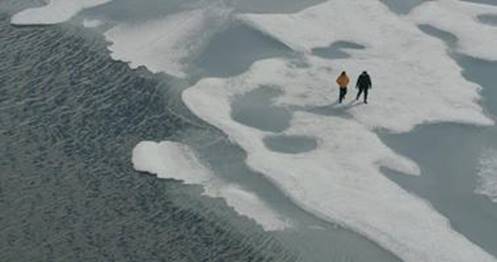
Following the screening, Harry Wright, Co-Vice-Chair of the Young Professionals moderated a Q and A session with Paula Owen, founder and CEO of Green Gumption ; Joanna Haigh CBE: Co-Director of the Grantham Institute, Imperial College; and Georgina Shiplee, Sustainability Consultant at Corporate Citizenship.
2016
Annual Report 2016.pdfStill shortcomings in UK race strategy, say human rights experts .pdf
UNA Westminster marks UN International Day of Peace .pdf
UNA Westminster joins other London groups to support the new London Declaration .pdf
The UN's drugs policy; right at last or so, so wrong?.pdf
UNA Westminster co-hosts seminar ‘A Solemn Duty’: Dag Hammarskjold and Conflict in the Congo’ held at the School of Advanced Study, University of London .pdf
UNA Westminster joins service to mark 70th anniversary of the first meeting of the UN General Assembly in London in 1946.pdf
2015
Annual Report 2014.pdfAnnual Report 2015.pdf
6 December 2015
Celebrating the UN at 70 and Austria’s membership at 60 .pdf
10 October 2015
Report on Study Tour visit to Vienna, 5-9 October 2015 .pdf
17 September 2015
Bar Council marks UN70 with diplomatic reception in Inner Temple .pdf
16 July 2015
“Sowing the Whirlwind: Nuclear Politics and the Historical Record” conference to mark the 70th anniversary of the bombing of Hiroshima and Nagasaki .pdf
Video Dr Akiko Mikamo
Video Professor Matthew Jones
Video Professor Peter Kuznick
Video Andreas Persbo
Video Bruce Kent
2014
Annual Report .pdf28 July 2014
UNA Westminster briefs diplomats on Hammarskjöld Commission Report.pdf
26 September 2014
Flights for Peace.pdf
Branch Meeting: ‘Does the UK have a credible race equality strategy or is a new vision required?.pdf
2013
23 January 2013
Annual General Meeting .pdf
Annual Report .pdf
29 January 2013
Sport for Peace project launch .pdf
Sport for Peace proposal .pdf
Antarctic photo exhibition .pdf
02 June 2013
Where next for nuclear disarmament? .pdf
02 July 2013
Fred Eckhard on Kofi Annan .pdf
22 September 2013
UN International Day of Peace event .pdf
Additional Reports
Christian Muslim ForumCordoba Foundation
Faith-based Regeneration Network
London Boroughs Faiths Network
Muslim Council of Britain
10 July 2013
Submission of Olympic Truce evidence to House of Lords Committee .pdf
Supplementary written submission .pdf
Lords Committee on Olympic and Paralympic Legacy
Compilation of all written submissions .pdf
LOCOG/FCO Report on Olympic Truce Legacy .pdf
2012
24 January
Human Rights for
Sexual Minorities .pdf
Backgrounder .pdf
Report: Bay Area Reporter
Report: Intersex Network
26 June
The Olympic Truce, historic and universal; for all the peoples .pdf
24 August
Marking the Olympic Truce .pdf
13 November
Is Equality Lite the new Human Rights Standard Notice .pdf
Report .pdf
Prof Hepple’s memorandum on Clause 56 .pdf
Lords debate on Enterprise and Regulatory Reform .pdf
10 December
Somalia: Open for Business Conference programme .pdf
Press release .pdf
9 January 2013
House of Lords debate
Clause 56: Commission for Equality and Human Rights, Amendment 27
2011
1 April
Greenland Theatre Evening National Theatre
5 April
Human Rights Film Season Regents College
8 June
UN Veterans Association Inaugural meeting Victory Services Club, London .pdf
12 July
So how will we feed the bottom billion? Food Security Meeting, House of Lords .pdf
2 September
Remembering Dag Hammarskjold Reception, Swedish Ambassador's residence
3 September
Dag Hammarskjold, the United Nations and the End of Empire, 50th anniversary conference
19-26 November
5th We The Peoples Film Festival
12 December
Time to alter the established order of our Human Rights - or to defend it? House of Lords .pdf
Annual General Meeting .pdf
Annual Report .pdf
2010
MDG6: targets, policies and where now? .pdf
Overview .pps
Tuberculosis .pps
Malaria .pps
The UN at war: FDR's global UN Day 1942 Lessons for a stronger UN today Dr Dan Plesch .pdf
Article, History Today, June 2010
10 May
Who deserves to stay on the UN Human Rights Council? The record on women's rights .pdf
27 July
Welcome to Thebes, New production at the Royal National Theatre .pdf
29 November
Annual General Meeting .pdf
Annual Report .pdf
2009
Islam, Democracy and Human Rights .pdf
Global Monitoring Checklist on Women, Peace and Security (UNSCR 1325) .pdf
Somalia: can its diaspora in Europe help the UN find a workable plan? Launch of G18 group and Joint Statement .pdf
somalijointstatement.info
The Attack on World Poverty Lecture and Book Launch .pdf
Annual Report .pdf
2008
Universal Declaration of Human Rights 60th Anniversary Concert, 4 July
"Is there a Right to Development?" Professor Sir Richard Jolly
Annual General Meeting .pdf
Annual Report .pdf
2007
Women, Peace and Security .pdf
Elizabeth MacKeith:
A Tea Party to mark her past and continuing work for the United Nations Association .pdf
Photographs from the party
The Ahtisaari proposal for Kosovo: a path to integration or stalemate? .pdf
"New Challenges for the United Nations and its Member States" .pdf
HRH Prince Turki Al-Faisal
Annual General Meeting .pdf
Annual Report .pdf
2006
When the Security Council fails to act .pdf
Professor Francoise Hampson, University of Essex, Mr Zvi Rav-Ner, Minister, Embassy of Israel, Mr Alexander Sternik,
Senior Counsellor, Embassy of the Russian Federation
"The new Human Rights Council: is the UN reform programme on course?"
Professor Peter Willetts, Professor of Global Politics, City University
Liberia: Nation Building in a troubled region .pdf
Alan Doss
Special Representative of the Secretary-General for Liberia
Time for common sense in the UN's drugs policy: but will the UN and its member states dare to listen? .pdf
Professor Cindy Fazey, Grantley Haines
Stories from the Field - UN Film Festival .pdf
Annual Report 2006 .pdf
2005
Middle East Peace Process .pdf
Service to mark 60th anniversary of the United Nations, St Paul's Cathedral 24th October 2005
The Cathedral, filled to its 2400 capacity with people from many faiths, hosted the service led by Her Majesty the Queen accompanied by HRH the Duke of Edinburgh. The Duke of Edinburgh and Tony Blair, Prime Minister, read the lessons. Lord (Paddy) Ashdown gave the address. The Bishop of London preached the sermon.
A Ray of Hope, the choir from six schools in Belfast sang the Gaelic Prayer. Before the service, Tony Blair and other leading politicians met the thirty five pupils comprising A Ray of Hope posing with them for photographs. Later, the Westminster and the Blackheath & Greenwich Branches invited 250 guests to the Reception in the Crypt, located under the Cathedral. Music was provided by Sherrifo from Gambia who was touring the UK at the time. Also A Ray of Hope sang two further songs.
Members of the Westminster branch secured funding for and planned the Service and provided the majority of logistic support for it and the Reception in the Crypt which followed.
Address: The Rt Hon Lord Ashdown, KBE
St Paul's Service, photos
A Ray of Hope
Annual Report 2005 .pdf
2004 - 2002
Iraq: Time to bend the UN Charter .pdf
Comment .pdf
UN Security Council Reform .pdf
Message to UNA Ghana .pdf
Annual Report 2002 .pdf
Annual Report 2003 .pdf
Annual Report 2004 .pdf
2001
HE Dr Ismail Serageldin
Globalisation and the fight against poverty .pdf
World Conference Against Racism .pdf
Proposals .pdf

